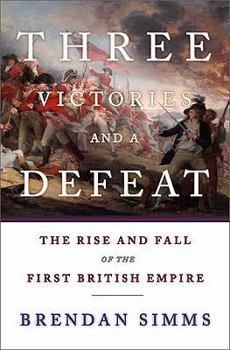Three Victories and a Defeat: The Rise and Fall of the First British Empire
Select Format
Select Condition 
Book Overview
In the eighteenth century, Britain became a world superpower through a series of sensational military strikes. Traditionally, the Royal Navy has been seen as Britain's key weapon, but in Three Victories and a Defeat Brendan Simms argues that Britain's true strength lay with the German aristocrats who ruled it at the time. The House of Hanover superbly managed a complex series of European alliances that enabled Britain to keep the continental balance of power in check while dramatically expanding her own empire. These alliances sustained the nation through the War of the Spanish Succession, the War of the Austrian Succession, and the Seven Years' War. But in 1776, Britain lost the American continent by alienating her European allies. An extraordinary reinterpretation of British and American history, Three Victories and a Defeat is a masterwork by a rising star of the historical profession.
Format:Hardcover
Language:English
ISBN:0465013325
ISBN13:9780465013326
Release Date:December 2008
Publisher:Basic Books
Length:800 Pages
Weight:0.05 lbs.
Dimensions:2.2" x 6.9" x 9.0"
Age Range:18 years and up
Grade Range:Postsecondary and higher
Customer Reviews
2 ratings
Seminal Treatment of Britain's 18th Century
Published by Thriftbooks.com User , 15 years ago
This book describes the diplomatic and military history of Great Britain from 1701 to 1783; it does so as part of a comprehensive case for the "Eurocentric" thesis in British diplomatic history. The ultimate outcome, of course, is the creation of the American Republic (or "partition of Britain"), which Simms demonstrates to have been the result of events in Continental Europe rather than in the Colonies. The book is naturally organized around the War of the Spanish Succession (1701-1713), the War of the Austrian Succession (1740-1748), the Seven Years War (1756-1763), and the War of American Independence (1770-1783). The first three of these were categorically European wars, with fairly modest naval theaters. The last was a complicated combination of naval and North American engagements; the European modality of the conflict was exclusively diplomatic, but that was to prove decisive. The first three wars featured an insidious dwindling of Britain's European allies: a grand alliance of the Netherlands, Portugal, Savoy, Austria, Prussia, and Hanover combined with Britain to contain Louis XIV. The constant opportunistic maneuvers by successive ministries (in London and elsewhere) destroyed mutual trust in the system of alliances, but not the will to wage war. Britain was nearly left at the altar in 1740, when its foreign secretaries sought Austrian assistance with nothing in return; then again, in 1756, when everyone swapped partners and it was stuck with Prussia. In both 1710 and again, in 1761, the British government abruptly abandoned its allies when it got what it wanted (and changed governing parties); this led directly to the isolation of 1775. The victory of 1763 was staggering in its magnitude; it left Britain the master of America, the African littoral, and South Asia. The victories were so sweeping they not only made Britain politically incapable of making the compromises needed to cultivate alliances, but also left it a defense perimeter of unmanageable size. Most of Continental Europe was either in a revanchist mood, or else exasperated by Britain's rough handling of neutrals. Hence, when the Revolution erupted in New England, the UK soon found itself at war with every single continental power; it was unable to open a front on the Continent, unable to tie down France, and paralyzed by violent extremes of public opinion at home. The book is so excellent because it rises to meet an extraordinary challenge: it describes with maximum efficiency the crucial diplomatic/strategic transformations that made Britain the first true global superpower. Simms has to marshal immense documentary evidence merely to describe what happened, let alone defend his thesis. He does so with profound effectiveness because he never pads his prose. There are no digressions on whether we should judge the characters by our own standards or theirs, no efforts to "novelize" the narration with speculations on the actors' impressions or motives. Most of the time,
Brilliant work!
Published by Thriftbooks.com User , 16 years ago
This volume is not only essential reading for the British history buff, but also for the American history buff, offering an understanding of the British political mindset in the 1700's. It is not an easy book for the average American reader, and assumes a greater understanding of British and European history than most of us might have, so the initial learning curve is somewhat steep. The American Revolution did not occur in a vacuum, and what Simms implicitly provides is a background into the development of British policy and attitudes towards the American colonies, and an understanding of American attitudes that grew out of the same era, including why the British (and Americans) disliked large standing armies, why the employment of Hessian soldiers was standard operating procedure long before the American Revolution, and how the colonial militias were wholly ineffective during the French and Indian War (just as they were later during the War of 1812) necessitating the use of British regulars and Hessians, and running up the costs of the war that were to be recompensed by the hated Stamp Act and other taxes. An American history buff will have many "Eureka!" moments as new light is shed on the hackneyed and overly-simplified causes of the American Revolution that have been taught on this side of the Atlantic. Simms' study of the political and military connections of Britain to Hanover and the balance of power in Europe lends a whole new perspective to the rise of Britain during the 1700's and serves as prelude to the American Revolution and Napoleonic wars. Some of his characterizations of the American colonists, and all their shortcomings and foibles, show that Americans haven't really changed all that much over the intervening two hundred years. A "must read!"





